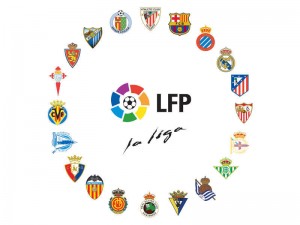
La Liga is a global powerhouse of football, but might its clubs be in financial trouble?
Tapping the word ‘Spain’ into Google news yields a mixed bag of results. Debt, crisis, property, Mariano Rajoy and King Juan Carlos have featured prominently over the past 12 months, but everything – and I mean everything – plays second fiddle to football, particularly if it is international weekend.
Understandable, really. Beneath the gloomy economic cloud that has hovered over Spain for the past few years, the silver lining has been La Selección – Spain’s football team. Winners of three consecutive international tournaments, the Spanish team is nigh-on untouchable. Usually…
So when a late equaliser by plucky upstarts Finland threatens to derail Spain’s normally smooth path to the next World Cup (the teams drew 1-1 on Friday, March 22), headline after headline comes a-knocking.
But buried within the plethora of football stories was the news that Spain’s domestic game – hitherto largely protected from the financial crisis due to its global popularity and the government’s proclivity for looking the other way when it comes to clubs’ finances – could be at risk from EU tax collectors.
Authorities in Brussels have called upon the Spanish government to ask them why many of La Liga’s largest football clubs have vast social security debts and unpaid tax bills. In what amounts to public funding of sporting institutions, the EU has lost patience. If their proposals are pushed through, clubs as famous as Racing Santander and Deportivo de La Coruña could face extinction.
Other clubs, such as Valencia, would be in serious trouble if their debts were called in. The total tax debts of Spain’s football clubs top €690m – a situation MEPs see as unfair, particularly as the government is asking for €40bn in aid from eurozone tax payers.
“This is unfair since all other Spanish taxpayers, as well as the other European football clubs, must, of course, be up to date with their tax payments,” said Willy Meyer, Spanish MEP for the United Left Coalition. With multimillion-euro salaries the norm throughout La Liga, the situation is unsustainable.
“It is incomprehensible that while taxes such as VAT are being increased and hospitals and public companies are being privatised as a means of generating short-term resources, these private, recreational bodies are receiving preferential treatment,” added Meyer.
Professor José María Gay de Liebana from the University of Barcelona has said that a combination of reckless lending and intense European competition has created a bubble that must eventually burst.
“When people ask me what clubs could be in danger, I reply with the list of the only clubs that are not in any kind of danger,” he said.
“They are Barcelona, Real Madrid and Athletic Bilbao.”
The non-payment of taxes by these clubs is a national scandal, and other European nations are angry; understandably so. Whether Spaniards themselves will have the same level of ire and vitriol at the ready remains to be seen. They will certainly hate the hypocrisy, but football is an important facet of life in Spain – a rare ray of happiness in the gloom. If their clubs suffer, so might their all-conquering national side: bad news for a Spaniard, but great news for everybody else…
 en
en



 Vlaams-Nederlands
Vlaams-Nederlands
0 Comments
Leave a Comment
DISCLAIMER
The opinions and comments expressed by contributors to this Blog are theirs alone and do not necessarily reflect the views of VIVA Homes Under the Sun Ltd, any of its associated companies, or employees; nor is VIVA to be held responsible or accountable for the accuracy of any of the information supplied.
Have you got something to say?